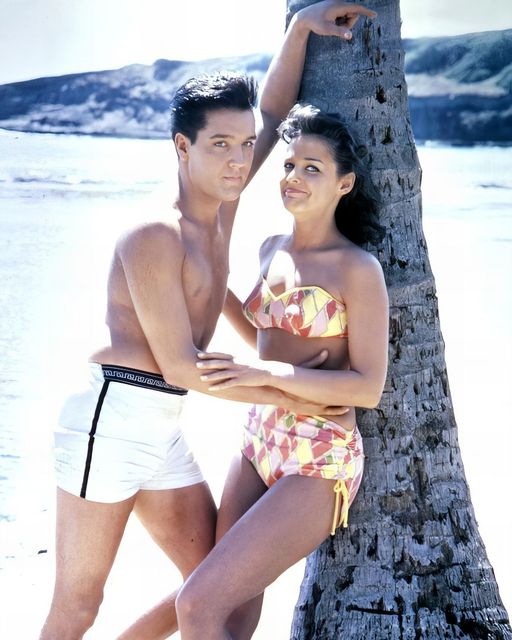In the early 1960s, Elvis Presley was already a household name, but “Blue Hawaii” was set to elevate his legacy in ways no one could have imagined. Filmed on the golden sands and lush hills of Hawaii, the movie wasn’t just another Elvis vehicle—it was a showcase of his charm, wit, and ability to make a simple, lighthearted story unforgettable.
The film’s premise was straightforward: Chad Gates, fresh from military service, returns to his family’s Hawaiian estate. But unlike the usual roles Elvis had played up until then—those of the musician, the crooner, the dreamer—Chad was different. He wasn’t a performer this time. Yet, Elvis, with his signature style, couldn’t resist breaking into song. Whether on the beach, lounging under the palm trees, or paddling a canoe, Chad’s spontaneous serenades brought the film to life with the same energy that had made Elvis a global superstar.
Though the movie might have been considered cheesy by some, it captured a certain carefree, escapist magic that resonated deeply with fans. The combination of picturesque landscapes, catchy songs, and the laid-back Hawaiian vibe made “Blue Hawaii” an instant fan favorite. More than just a movie, it was an invitation to escape into the world of paradise, and Elvis was its perfect guide.
Behind the scenes, the movie was filled with moments that would go on to become legendary. As Elvis made his way off the plane in one of the opening scenes, the sounds of real-life fans screaming could be faintly heard in the background. Local Hawaiians, eager to see their idol in person, swarmed the set. Their enthusiasm was so contagious that the sound editors couldn’t fully mask it, making it a perfect, albeit unexpected, tribute to the King’s massive fan base.
“Blue Hawaii” would forever be a symbol of Elvis’s appeal—his infectious charisma, his effortless style, and his ability to transcend the boundaries of cinema and music. Thanks to the film’s success, Colonel Tom Parker, Elvis’s manager, saw a massive opportunity, propelling the King to a new height of superstardom and ensuring his place in the top ten box-office stars list for much of the 1960s. Despite not being considered one of Elvis’s finest works, “Blue Hawaii” remains a testament to his ability to capture hearts with nothing more than his presence and his voice.
The movie wasn’t just a film; it was a slice of paradise, and Elvis Presley was, as always, the king.
